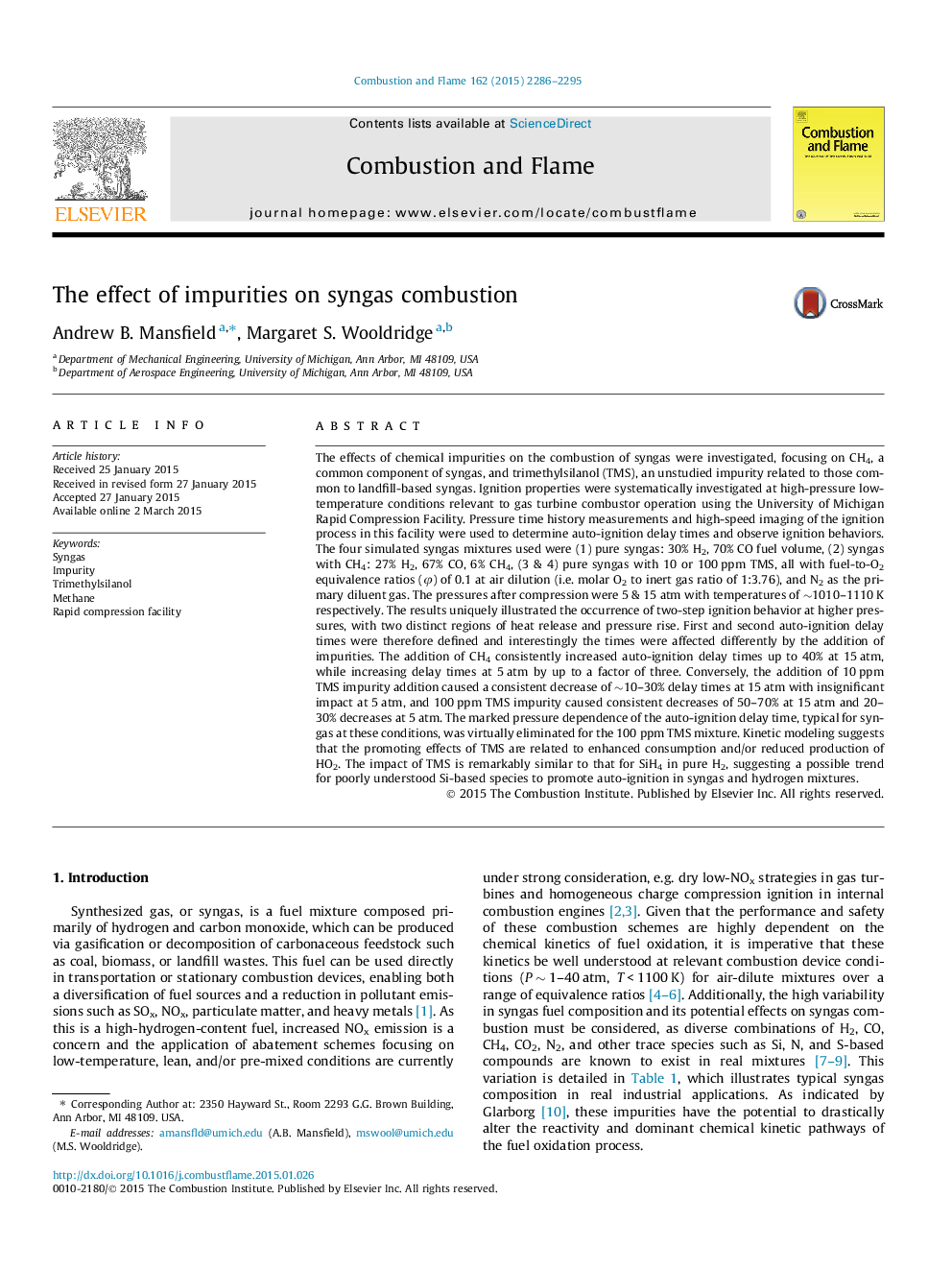| کد مقاله | کد نشریه | سال انتشار | مقاله انگلیسی | نسخه تمام متن |
|---|---|---|---|---|
| 10264325 | 457756 | 2015 | 10 صفحه PDF | دانلود رایگان |
عنوان انگلیسی مقاله ISI
The effect of impurities on syngas combustion
ترجمه فارسی عنوان
اثر ناخالصی در احتراق سینگاس
دانلود مقاله + سفارش ترجمه
دانلود مقاله ISI انگلیسی
رایگان برای ایرانیان
کلمات کلیدی
همگاز، ناامیدی، تری متیل سیلانول، متان، امکانات فشرده سازی سریع،
موضوعات مرتبط
مهندسی و علوم پایه
مهندسی شیمی
مهندسی شیمی (عمومی)
چکیده انگلیسی
The effects of chemical impurities on the combustion of syngas were investigated, focusing on CH4, a common component of syngas, and trimethylsilanol (TMS), an unstudied impurity related to those common to landfill-based syngas. Ignition properties were systematically investigated at high-pressure low-temperature conditions relevant to gas turbine combustor operation using the University of Michigan Rapid Compression Facility. Pressure time history measurements and high-speed imaging of the ignition process in this facility were used to determine auto-ignition delay times and observe ignition behaviors. The four simulated syngas mixtures used were (1) pure syngas: 30% H2, 70% CO fuel volume, (2) syngas with CH4: 27% H2, 67% CO, 6% CH4, (3 & 4) pure syngas with 10 or 100Â ppm TMS, all with fuel-to-O2 equivalence ratios (Ï) of 0.1 at air dilution (i.e. molar O2 to inert gas ratio of 1:3.76), and N2 as the primary diluent gas. The pressures after compression were 5 & 15Â atm with temperatures of â¼1010-1110Â K respectively. The results uniquely illustrated the occurrence of two-step ignition behavior at higher pressures, with two distinct regions of heat release and pressure rise. First and second auto-ignition delay times were therefore defined and interestingly the times were affected differently by the addition of impurities. The addition of CH4 consistently increased auto-ignition delay times up to 40% at 15Â atm, while increasing delay times at 5Â atm by up to a factor of three. Conversely, the addition of 10Â ppm TMS impurity addition caused a consistent decrease of â¼10-30% delay times at 15Â atm with insignificant impact at 5Â atm, and 100Â ppm TMS impurity caused consistent decreases of 50-70% at 15Â atm and 20-30% decreases at 5Â atm. The marked pressure dependence of the auto-ignition delay time, typical for syngas at these conditions, was virtually eliminated for the 100Â ppm TMS mixture. Kinetic modeling suggests that the promoting effects of TMS are related to enhanced consumption and/or reduced production of HO2. The impact of TMS is remarkably similar to that for SiH4 in pure H2, suggesting a possible trend for poorly understood Si-based species to promote auto-ignition in syngas and hydrogen mixtures.
ناشر
Database: Elsevier - ScienceDirect (ساینس دایرکت)
Journal: Combustion and Flame - Volume 162, Issue 5, May 2015, Pages 2286-2295
Journal: Combustion and Flame - Volume 162, Issue 5, May 2015, Pages 2286-2295
نویسندگان
Andrew B. Mansfield, Margaret S. Wooldridge,
